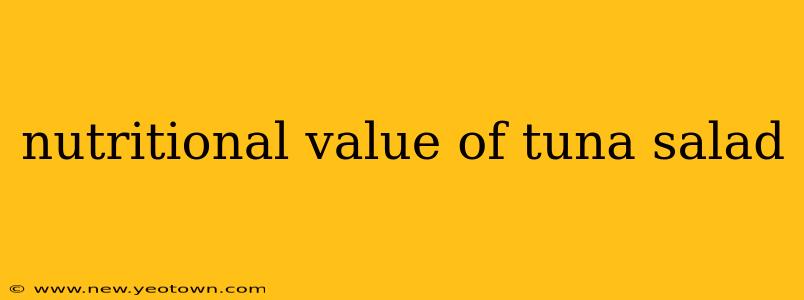Tuna salad. The classic sandwich filling, the quick lunch staple, the picnic party essential. But have you ever stopped to consider the nutritional powerhouse packed into that seemingly simple dish? Let's go beyond the basic mayo-and-tuna combo and explore the surprising nutritional value of this culinary chameleon. This isn't just about calories; we're diving into vitamins, minerals, and the overall impact on your health.
What are the main nutritional benefits of tuna salad?
The nutritional benefits of tuna salad stem primarily from its star ingredient: tuna. This oily fish is brimming with Omega-3 fatty acids, renowned for their heart-healthy properties. These essential fats contribute to reducing inflammation, lowering triglyceride levels, and even improving brain function. Beyond Omega-3s, tuna is a fantastic source of protein, crucial for building and repairing tissues, supporting a healthy metabolism, and keeping you feeling full and satisfied.
But the story doesn't end there. Depending on the recipe, your tuna salad can also boast a decent amount of vitamins and minerals from added ingredients. Think celery for fiber, hard-boiled eggs for extra protein and choline, and even a dollop of avocado for healthy fats and potassium. The combination creates a surprisingly well-rounded and nutritious meal.
Is tuna salad healthy for weight loss?
This is a question with a nuanced answer. Tuna salad can be part of a healthy weight loss plan, but it's not a magic bullet. The calorie count can vary wildly depending on the ingredients. A salad made with light mayo, plenty of vegetables, and a modest amount of tuna will be far lower in calories than a version drenched in creamy dressing and heavy on the bread. The high protein content of tuna helps to promote satiety, meaning you'll feel fuller for longer, which can be beneficial for managing your weight. However, portion control remains key. Be mindful of your serving sizes to avoid consuming excess calories.
How many calories are in a typical tuna salad sandwich?
This is highly dependent on the recipe and the type of bread used. A basic tuna salad sandwich on whole wheat bread, made with light mayonnaise and some veggies, might contain anywhere from 300-400 calories. However, adding extra mayonnaise, cheese, or using a high-calorie bread can easily push that number to 500 calories or more. It's essential to check the nutritional information of your ingredients and be aware of your portion sizes to accurately estimate the calorie count of your tuna salad.
What are the potential health risks associated with eating too much tuna salad?
While tuna salad offers many health benefits, overconsumption can present some risks. Tuna, especially canned tuna, contains mercury, a heavy metal that can be toxic in high amounts. Regular, but moderate, consumption of tuna is generally considered safe, but eating excessive amounts over an extended period could lead to mercury buildup in the body. Additionally, the mayonnaise in tuna salad is high in fat and calories, contributing to weight gain if consumed excessively. Finally, pay close attention to ingredients if you have allergies or sensitivities.
Is canned tuna as healthy as fresh tuna?
This is a common point of debate. While fresh tuna undeniably retains more of its nutrients during preparation, canned tuna still packs a nutritional punch. The canning process can lead to some nutrient loss, particularly certain vitamins, but it still provides a significant source of protein and omega-3 fatty acids. Choosing low-sodium canned tuna can further improve the health profile, minimizing sodium intake.
Conclusion: A Balanced Approach to Enjoying Tuna Salad
Tuna salad, when made thoughtfully, is a versatile and nutritious food. It’s a delicious way to enjoy the heart-healthy benefits of tuna while incorporating other nutritious ingredients. However, mindful eating and balanced choices remain key. Be aware of your portion sizes, consider healthier alternatives like light mayonnaise or avocado, and remember that moderation is vital to reap the rewards and mitigate any potential health risks.

